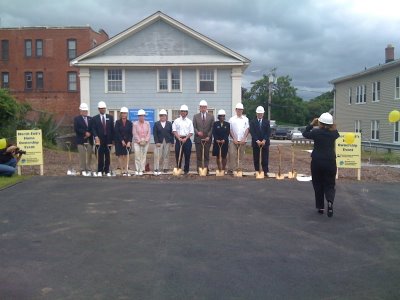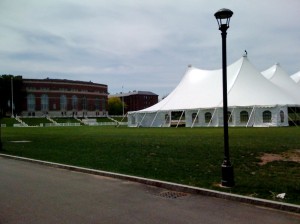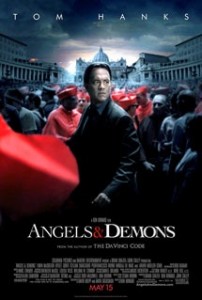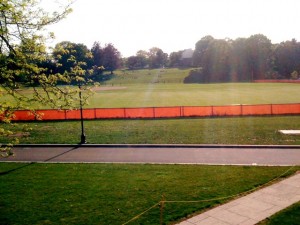From my windows at South College, the campus looks very quiet. The young students from the Center for Creative Youth and other programs stroll across Andrus Field for meals in Usdan, but on the whole it’s just too calm. So just before leaving for some time away from Wesleyan, I stopped into the Hall-Atwater labs to check out the action there
The pace changes completely when you cross Church Street and visit the science labs. There dozens of undergraduates and graduate students are busily working with faculty on sophisticated research projects in chemistry, molecular biology, physics and neuroscience (to cite just a few of the examples). There are countless examples of interdisciplinary work in fields like neuroscience, biophysics and environmental science. Much of the research going on during the summer month is funded by the Hughes Summer Research Program — http://www.wesleyan.edu/hughes/summerprogram.html — as well as funding from departments and faculty research grants. Many of our students will turn this work into theses projects, and some will be fortunate enough to become co-authors with faculty on articles in the best scientific journals. Graduate students play a crucial role in the ecology of research in the sciences. They bring experience and a depth of learning that allow them to help mentor younger students, and they complete independent projects that launch their own careers after receiving their degrees. Grad students don’t substitute for faculty at Wesleyan, but they are an essential complement to them. One of the reasons our science faculty is extraordinarily productive compared with our peer institutions, is that they have great collaborators at different levels. This benefits everyone, and it helps advance the fields in which our faculty work.
My final stop in my little tour was at Prof. Janice Naegele’s lab. Jan‘s work is in neuroscience and stem cell research, and several of her students are working on problems related to epilepsy. I was so impressed by the students’ presentations of their specific projects. They were able to explain their specific investigations and also give this non-scientist a sense of the context for their advanced work. Fludiona Naka ’11 and Raghu Appasani ‘12 gave concise yet informative descriptions of their lab activities. It also helped me that senior Efrain Ribeiro is a joint philosophy-neuroscience major, and so he could put things in terms even I could understand! All were clearly excited about their independent experiments, and they also had an impressive ability to describe how it fit into the work of the team. Other members of the lab are Debra Hall, Xu Maisano, Jia Yang and Sara Royston.
You can learn more about the exciting work of the biologists at Wesleyan by visiting the cool new website: http://www.wesleyan.edu/bio/
The sciences at Wesleyan exemplify the success of the scholar-teacher model that has long been key to our school. Long live Biology!
[tags]Biology, Hall-Atwater, research, lab research, Hughes Summer Research Program, graduate students, Debra Hall, Xu Maisano, Jia Yang, Sara Royston, Janice Naegele, Fludiona Naka, Raghu Appasani, Efrain Ribeiro[/tags]



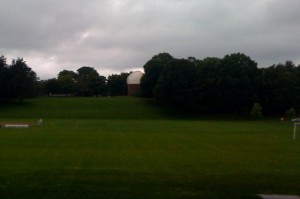 As is often the case, as we think about new programs we are also reminded of our past. In the final days of the fiscal year Wesleyan was the beneficiary of a significant bequest. John Pallein graduated with an English major in 1950, and spent the next two years in the US Army, serving in Japan and Korea. He began working as a technical writer, first for Pratt and Whitney and later for Beckman Instruments. I met John in California just before I moved back to Middletown, and it was clear that he felt a strong loyalty to alma mater. We talked about his work in the President’s House for Victor Butterfield’s family, and his enthusiasm about recent Wes students he had met. A gentle and amiable person, we spoke about the difficulties of leaving the West Coast after so many years. John had settled in one of the most beautiful spots I’d ever seen, Dana Point, but it was clear that Middletown was a locus of cherished memories for him. John’s bequest of more than $3 million will endow financial aid packages for Pallein Scholars in perpetuity, so that deserving students can also have access to the kinds of transformative educational experiences that served him so well.
As is often the case, as we think about new programs we are also reminded of our past. In the final days of the fiscal year Wesleyan was the beneficiary of a significant bequest. John Pallein graduated with an English major in 1950, and spent the next two years in the US Army, serving in Japan and Korea. He began working as a technical writer, first for Pratt and Whitney and later for Beckman Instruments. I met John in California just before I moved back to Middletown, and it was clear that he felt a strong loyalty to alma mater. We talked about his work in the President’s House for Victor Butterfield’s family, and his enthusiasm about recent Wes students he had met. A gentle and amiable person, we spoke about the difficulties of leaving the West Coast after so many years. John had settled in one of the most beautiful spots I’d ever seen, Dana Point, but it was clear that Middletown was a locus of cherished memories for him. John’s bequest of more than $3 million will endow financial aid packages for Pallein Scholars in perpetuity, so that deserving students can also have access to the kinds of transformative educational experiences that served him so well.